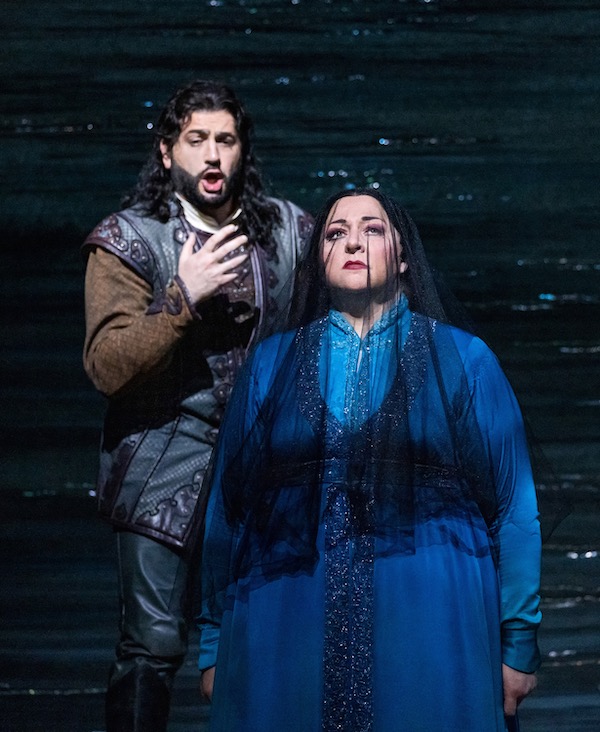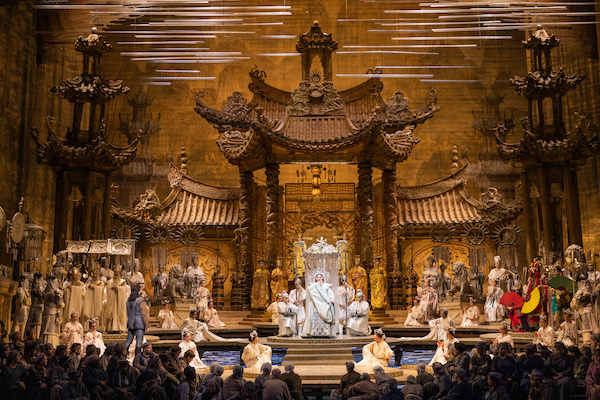Zeffirelli’s spectacular “Turandot” returns to the Met

The Metropolitan Opera is back and doing what it does best with a revival of Franco Zeffirelli’s dazzling production of Puccini’s Turandot. If over-the-top extravagance, still keeping within the parameters of good taste, is your cup of tea, the Met’s Turandot is the show to catch this season.
The story is as old as the riddle of the Sphinx and familiar to anyone with even a chance acquaintance with fairy tales. In this Euro-interpretation of a fantasy from legendary China, the beautiful, icy princess Turandot poses three questions to her many suitors. These puzzlers are dramatically echoed in the orchestra by three notes (E, F natural, and C sharp), adding a sense of instability and impending doom. Whoever solves the puzzles may have her hand in marriage. But those who attempt and fail are sentenced to a gruesome death. It’s really a horrible story, and Turandot, for all her charms, is an unholy terror, smugly sending love-smitten princes to the chopping block.
But there is another side to the story. From this view, the desirable royal is attempting to preserve her independence from the control of men who would assume control of her property, her body and especially her soul upon marriage. In an ambiguous turn of events, one of the suitors (Calàf, or the Prince without a Name) solves the riddles and claims his prize. Although the final images on stage are of a beaming Prince and Princess, shoulder-to-shoulder as they embark on an ideal life together, the Princess has lost control of every aspect of her life and has driven the one woman who truly loved the Prince to an agonizing suicide.
In the title role Christine Goerke channels Turandot with her full voice oscillating between expressions of greed, meanness, and fear. She is indomitable yet crumbles, aghast that a man could solve the riddles she presents. Goerke conveys this confusion—the violence, the indecision, the tenderness –with power and vulnerability. Goerke’s character evolves smoothly from initial impressions of glacial indifference to a warming affection for the one man who can answer her questions and provide a riddle of his own. In these later moments, her voice is strong, but liquid, melting into the first stirrings of affection.
Handsome and personable, Yusif Eyvazov is well cast as Turandot’s formidable adversary and eventual lover, shining in “Nessun dorma.” Eyvazov brings his own personal touches to this celebrated showpiece aria holding that sensational high “B” for longer than strictly necessary. It’s a beautiful rendition, one that Eyvazov can proudly and legitimately claim as his own, and clearly impressed an enthusiastic opening-night audience.
Despite the extraordinary power of the Princess’s solos, Eyvazov and Goerke are an excellent match not only vocally, their timbres and volume complementing each other, but also in terms of on-stage charisma and presence. The concluding duet (composed by Franco Alfano after Puccini’s death left the final scene unfinished) is carried off with panache, but one cannot help but think that as Calàf’s star rises, Turandot’s inevitably will fall.
Gabriella Reyes as Liù, the servant who tends Calàf’s father, Timur, was moving in her two solo arias. She brought emotionally nuanced vocalism, even if it lacked the innocence and naïveté one would desire for this important role. Reyes is especially touching in “Tu che di gel sei cinta,” a model of tender yearning.
James Morris, a baritone who has added so much to Met productions during the past half century, gives an affecting performance, sung with deep feeling, as the aged Timur. Cheerful light moments were provided by the trio of counselors led by baritone Hyung Yun as Ping (also high marks for Tony Stevenson and Eric Ferring completing the threesome). The dancers who take on roles in other scenes also are to be commended for their skill, good humor, and agility.
Under the direction of conductor Marco Armiliato, the soloists, chorus, and orchestra provide an assertive response to Puccini’s score, a complex mélange of Eastern and Western elements, with some creative orchestral twists and startling dissonance.
The overall impression of the proscenium staging was one of great visual detail and expansive opulence. At times, more than a hundred performers clustered on the expansive Met stage beneath soaring backgrounds of golden trompe d’oeil. In other scenes, a few obsequious servants scampered low creating an undercurrent of mystery and unrest below smokey blue-grey skies. Throughout the production, cast members lithely navigated the treacherous steps and flooring with raised circular platforms. White silken sleeves of chorus members were elegantly shaken into the air, Peking opera-style, and open fans fluttered like captive doves as the spectacular final scene unfolded in all its extravagant glory.
Turandot runs through November 16. Anna Netrebko and Younghoon Lee take over the starring roles April 30-May 14. Turandot will be broadcast in The Met’s Live in HD series May 7, 2022. metopera.org.
